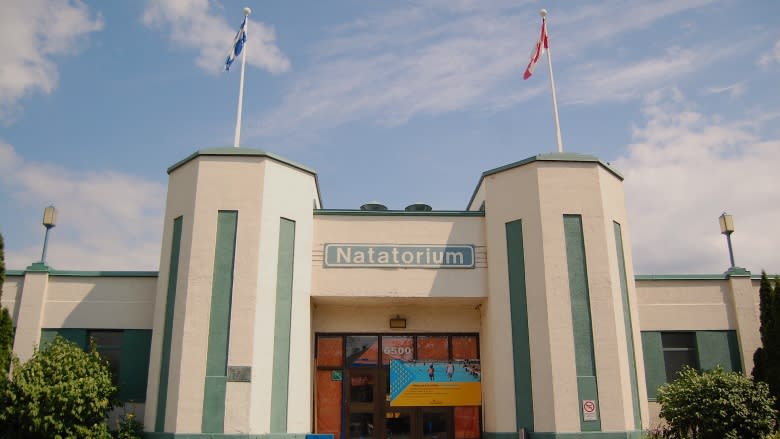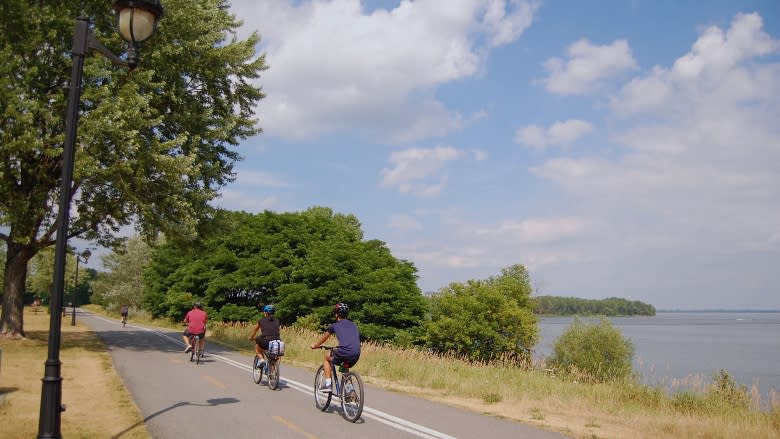'Verdun culture' shines through in stories about the neighbourhood
For Margo Legault, Verdun has always been a magical place.
While she didn't grow up there herself, she was raised on stories about the borough in the southwest part of Montreal — and it figures prominently on the pages of her family scrapbooks.
Her father, Ron, was raised there, playing soccer and hockey as a child, even meeting NHL great Doug Harvey when he came to the neighbourhood to sign autographs in 1960.
Her grandfather, Gerard, was a professional wrestler who often got in the ring at the Verdun Auditorium. He later became a promoter of the sport, putting on events locally.
"In all the stories and memories, Verdun sounded like such a magical place," Legault said.
Now the executive director of Literacy Quebec, a group that promotes and provides literacy training to English-speaking adults in the province, Legault is involved in a new project that celebrates all things related to the borough she loves so much.
Verdun Stories is a collection of poems, short stories, photos, artwork, audio and video testimonials, and anecdotes — all about Verdun.
The goal is to turn the submissions into a book by early next year, while encouraging community members to share their memories and develop reading and writing skills.
"We're not looking for professional writers; we're looking for community members who have something to share," said Legault, 39.
What makes a Verdun story?
So far, Literacy Quebec and its partner on the project, The Suspicious Fish, a Verdun-based creative literacy and arts program for students, have collected a few dozen submissions.
The groups have peppered the borough with flyers advertising the project, and they are organizing writing workshops at local cafés, using social media to help spread the word.
Evelyn Wakeling, 80, did an audio interview as part of the project.
She moved to Verdun at age eight, after her father built a home in the neighbourhood's Crawford Park area, west of what was then known as the Douglas Hospital.
"Everybody looked after each other's children. They kept an eye on each other, and that was Verdun in those days. I remember that well. You get on the bus, and you were always greeting people you knew," she said.
She moved out of the neighbourhood when she got married and started a family, only to come back 40 years later after her husband died.
"I came to appreciate again that open-door policy and the friendship in the neighbourhood that we grew up in," Wakeling said in her interview.
Shared experiences
Legault said "a Verdun culture" has already started to come out in the submissions.
"Many people mention the boardwalk, where they met their husband or spent a lot of time as children. Many people mention remembering playing hockey in those cold winter months outdoors at various parks in Verdun," she said.
Some have even said Verdun residents use their own, distinctive language.
"They were talking about going to The Nat — which is the Natatorium — so, 'I'll meet you at the Nat,'" Legault said.
Built in 1930, the Natatorium is thought to be the first and the largest outdoor public pool in Quebec. It was once able to accommodate 1,150 swimmers, according to the city.
"Meet you at the Red Top" was another popular refrain, Legault said, referring to a red-roofed gazebo by the St. Lawrence River waterfront.
"There's definitely a richness" to the stories collected so far, she said.
New residents also getting involved
Verdun stories aren't limited to the neighbourhood's longtime residents, though. In fact, as the area has developed over the past decades, so has its makeup.
Verdun officially became a municipality of its own in 1875, the city says on its website, and the neighbourhood's population grew in the early 20th century as working-class families moved out of central Montreal.
Thaiz de Lopez moved to Verdun in late April with her husband, Carlos.
Originally from Venezuela, the couple came to Canada to be closer to their two daughters, who live in Montreal with their families.
De Lopez, who is working to improve her English, said she decided to submit her work to the Verdun Stories project after taking a writing workshop in the neighbourhood.
"I've been writing about things in my life, about going to school and about living here in Verdun," the 57-year-old told CBC News.
In one short story, de Lopez wrote about her six-year-old granddaughter insisting on walking to summer school on her own.
The workshop helped stimulate her creativity, she said, and see every day events in her life as being worthy of sharing with others.
"Writing is kind of helping me to express my emotions," said de Lopez. It's also helped her meet some new neighbours.
That sense of community is a key component of the project, said Legault.
Verdun Stories organizers are hosting another writing workshop this week at a café on Wellington Street, and they are going to gathering spots across Verdun to spread the word.
"It's a very tight-knit community so word is getting out," she said.
"The main message is that everyone can write; anyone can share their story."
The next Verdun creative writing workshop takes place at Café BaoBab, 4800 Wellington Avenue, on July 25, at 7 p.m.
Find out more here.

 Yahoo Sports
Yahoo Sports 


